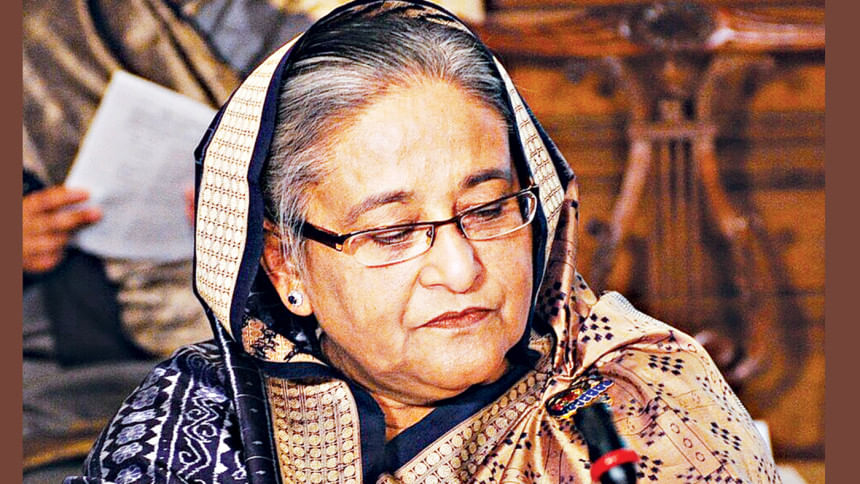ICT-1 sets Nov 17 for verdict in case against Hasina

The International Crimes Tribunal-1 yesterday announced that it will deliver its verdict in the case against deposed prime minister Sheikh Hasina and her two top aides on November 17.The three-member tribunal, led by Justice Md Golam Mortuza Mozumder, fixed the date amid tight security and a packed courtroom. After announcing the date within five minutes of the proceedings, the tribunal went into a 10-minute recess.In the case, Hasina, former home minister Asaduzzaman Khan Kamal, and former...
The International Crimes Tribunal-1 yesterday announced that it will deliver its verdict in the case against deposed prime minister Sheikh Hasina and her two top aides on November 17.
The three-member tribunal, led by Justice Md Golam Mortuza Mozumder, fixed the date amid tight security and a packed courtroom.
After announcing the date within five minutes of the proceedings, the tribunal went into a 10-minute recess.
In the case, Hasina, former home minister Asaduzzaman Khan Kamal, and former inspector general of police Chowdhury Abdullah Al-Mamun are accused of crimes against humanity during last year's July uprising.
Chowdhury Abdullah Al-Mamun later turned approver in the case.
The tribunal completed hearing arguments and concluded trial proceedings on October 23 before setting yesterday as the day to announce the date for judgement.
Security was beefed up around the tribunal since early morning. Members of the Bangladesh Army, Border Guard Bangladesh, Rapid Action Battalion, Armed Police Battalion and police were deployed, with armoured personnel carriers from both army and police stationed nearby.
The move came amid heightened tension, with the Awami League declaring a "lockdown" programme for the day, and incidents of crude bomb explosions and arson attacks on vehicles reported in the days leading up to yesterday.
After the trial proceedings, Chief Prosecutor Tajul Islam told reporters, "We hope the court will exercise its wisdom and prudence and do justice to the nation's long-awaited quest for justice."
He added that the prosecution had sought the highest punishment for the accused. "Through a rightful judgment, the tribunal will bring an end to the crimes against humanity committed in Bangladesh and set a precedent for the future."
Tajul warned that any attempt to derail the judicial process would amount to obstruction of court proceedings. "Those inciting unrest or attempting violence are being dealt with under the law, and that will continue," he said, hoping that whatever isolated incidents have occurred will have no impact.
State defence counsel Amir Hossain, representing Hasina and Asaduzzaman, voiced confidence that his clients would be acquitted.
"I have drawn out crucial facts through witness testimonies and cross-examinations, and even challenged the prosecution's documents where necessary. Given the evidence and the controversies that emerged, I am confident my clients will be acquitted."
Amir added that the trial had been fair and transparent, with no interference.
He, however, noted the difficulty of defending absent clients, saying their presence could have strengthened the case by providing documents or clarifications.
Replying to a query, Amir said former IGP Mamun turned approver merely to save himself by implicating his clients.
The three accused face five counts of crimes against humanity.
Count-1 accuses them of murder, attempted murder, torture, and other inhumane acts by law enforcement and armed Awami League cadres. The prosecution alleges that, following Hasina's July 14 press briefing, Asaduzzaman, Mamun, and other officials abetted and facilitated attacks on unarmed student protesters.
Count-2 charges ordering the use of lethal weapons, helicopters and drones to subdue student protesters, where the accused are allegedly guilty of superior command responsibility, complicity, facilitation and conspiracy.
Count-3 relates to the murder of Begum Rokeya University student Abu Sayed on July 16, where they issued orders, incited, abetted, facilitated, conspired and were complicit.
Count-4 accuses the defendants of orchestrating the murder of six unarmed protesters in the capital's Chankharpul on August 5 by direct order, incitement, abetment, facilitation, complicity, and conspiracy.
Count-5 concerns shooting dead five protesters and injuring one. It also accuses the three of burning the five dead bodies and another protester alive, in which the defendants are involved by way of complicity, facilitation and instigation.
Following the recess, ICT-1 continued to record the statement of the investigating officer over the August 5 Chankharpul killings. Recording of the testimony was then adjourned till November 18.
Meanwhile, the ICT-2 recorded the statement of Nayek Abu Bakkar Siddique as the 16th prosecution witness in the killing of Abu Sayed.